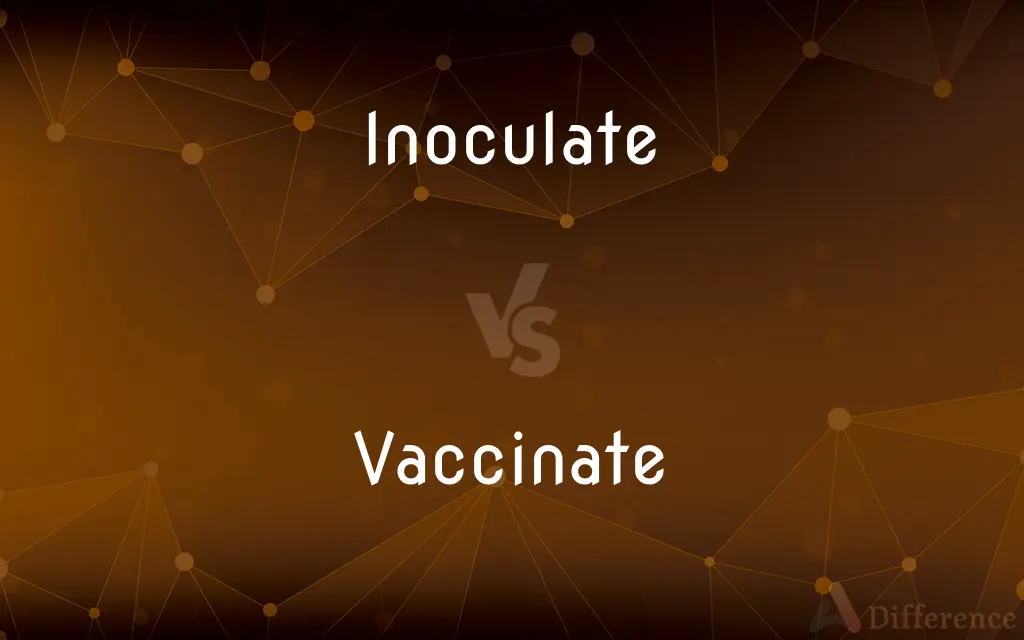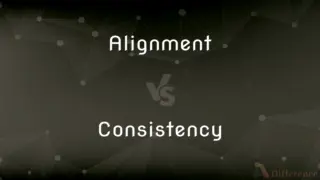Inoculate vs. Vaccinate — What's the Difference?
By Urooj Arif & Maham Liaqat — Updated on April 3, 2024
Inoculate involves introducing an agent to protect against disease, while vaccinate specifically uses a vaccine to confer immunity.

Difference Between Inoculate and Vaccinate
Table of Contents
ADVERTISEMENT
Key Differences
Inoculation is a broad term referring to the introduction of an agent into the body to prevent disease. This agent could be a live pathogen, a weakened form of the pathogen, or something else entirely that stimulates the body's immune response. Vaccination, however, is a subset of inoculation that specifically involves administering a vaccine. A vaccine is a biological preparation that provides active acquired immunity to a particular infectious disease.
Inoculation can be traced back to practices like variolation, where material from smallpox sores was introduced into healthy individuals to induce a mild form of the disease and confer immunity. Vaccination, on the other hand, began with Edward Jenner's use of cowpox material to immunize against smallpox, marking the start of vaccines as we understand them today. Therefore, all vaccinations are forms of inoculation, but not all inoculations are vaccinations.
The purpose of inoculation is to stimulate the body's immune system to recognize and fight specific pathogens without causing the full-blown disease. This can involve various methods and materials. Vaccination achieves this goal through the use of vaccines, which are scientifically developed to contain harmless components of pathogens (like proteins or sugars), weakened or dead pathogens, or a blueprint for producing pathogen components, like in the case of mRNA vaccines.
In terms of application, inoculation covers a wider range of techniques beyond infectious disease prevention, including allergy treatments and cancer immunotherapy. Vaccination specifically targets infectious diseases by introducing a vaccine into the body, usually through injection, to prompt an immune response that will protect against future infections by that pathogen.
The terminology difference also highlights the evolution of medical understanding and practices. Inoculation refers to an older, broader concept of disease prevention, while vaccination is a more modern term, reflecting advancements in medical science and the development of safe, effective vaccines against a wide array of diseases.
ADVERTISEMENT
Comparison Chart
Definition
Introducing an agent into the body to prevent disease.
Administering a vaccine to confer immunity.
Scope
Broad, includes various agents and methods.
Specific to the use of vaccines.
Historical Usage
Older practice, e.g., variolation for smallpox.
Began with Jenner's smallpox vaccine.
Purpose
To stimulate an immune response against disease.
Specifically to induce immunity against infections.
Techniques
Can include live pathogens, weakened forms, etc.
Involves biological preparations known as vaccines.
Compare with Definitions
Inoculate
Introduction of an agent to prevent disease.
She was inoculated with a weakened virus to build immunity.
Vaccinate
Usually given via injection.
The nurse vaccinated the patient in the upper arm.
Inoculate
Broad method for stimulating immunity.
Ancient practices of inoculation involved variolation.
Vaccinate
Centers on infectious disease prevention.
Global vaccination programs aim to eradicate polio.
Inoculate
General term for immune system preparation.
Inoculating individuals in this manner has historical precedence.
Vaccinate
Modern practice for preventing infectious diseases.
Annual flu vaccinations help reduce the impact of influenza.
Inoculate
Can involve non-vaccine substances.
Some cancer treatments involve inoculating the patient with modified cells.
Vaccinate
Specifically involves a biological preparation.
The vaccine contains attenuated viruses to safely stimulate immunity.
Inoculate
Can apply to various medical treatments.
The doctor inoculated the patient against allergies with a specific antigen.
Vaccinate
Administration of a vaccine to induce immunity.
Children were vaccinated against measles with the MMR vaccine.
Inoculate
Treat with a vaccine to produce immunity against a disease; vaccinate
He inoculated his tenants against smallpox
Vaccinate
To inoculate with a vaccine in order to produce immunity to an infectious disease, such as diphtheria or typhus.
Inoculate
To introduce a serum, vaccine, or antigenic substance into (the body of a person or animal), especially to produce or boost immunity to a specific disease.
Vaccinate
To perform vaccinations or a vaccination.
Inoculate
To communicate a disease to (a living organism) by transferring its causative agent into the organism.
Vaccinate
(transitive) To treat (a person or an animal) with a vaccine to produce immunity against a disease.
Inoculate
To implant microorganisms or infectious material into (a culture medium).
Vaccinate
To inoculate with the cowpox by means of a virus, called vaccine, taken either directly or indirectly from cows; now, generally, to administer (by injection or otherwise) any vaccine with the objective of rendering the recipient immune to an infectious disease. One who has been thus immunized by vaccination is said to be vaccinated against a particular disease. One may be thus immunized (vaccinated) also by oral ingestion or inhalation of a vaccine.
Inoculate
To safeguard as if by inoculation; protect
"A lapsed idealist, [she] has been inoculated against life's disappointments by her own skepticism" (John Lahr).
Vaccinate
Perform vaccinations or produce immunity in by inoculation;
We vaccinate against scarlet fever
The nurse vaccinated the children in the school
Inoculate
To introduce an idea or attitude into the mind of
"Young people ... are inoculated with the fervor, and are heard about the streets, singing the temperance songs" (Walt Whitman).
Inoculate
To introduce an antigenic substance or vaccine into something (e.g. the body) or someone, such as to produce immunity to a specific disease.
Inoculate
To safeguard or protect something as if by inoculation.
Inoculate
To add one substance to another.
The culture medium was inoculated with selenium to investigate the rate of uptake.
Inoculate
To graft by inserting buds.
To inoculate the bud of one tree or plant into another
To inoculate a tree
Inoculate
(figurative) To introduce into the mind (used especially of harmful ideas or principles).
To inoculate someone with treason or infidelity
Inoculate
To bud; to insert, or graft, as the bud of a tree or plant in another tree or plant.
Inoculate
To insert a foreign bud into; as, to inoculate a tree.
Inoculate
To communicate a disease to (a person) by inserting infectious matter in the skin or flesh, especially as a means of inducing immunological resistance to that or related diseases; as, to inoculate a person with the virus of smallpox, rabies, etc. See Vaccinate.
Inoculate
Fig.: To introduce into the mind; - used especially of harmful ideas or principles; to imbue; as, to inoculate one with treason or infidelity.
Inoculate
To introduce microorganisms into (a growth medium), to cause the growth and multiplication of the microorganisms; as, to inoculate a fermentation vat with an actinomycete culture in order to produce streptomycin.
Inoculate
To graft by inserting buds.
Inoculate
To communicate disease by inoculation.
Inoculate
Introduce an idea or attitude into the mind of;
My teachers inoculated me with their beliefs
Inoculate
Introduce a micro-organism into
Inoculate
Perform vaccinations or produce immunity in by inoculation;
We vaccinate against scarlet fever
The nurse vaccinated the children in the school
Inoculate
Insert a bud for propagation
Inoculate
Impregnate with the virus or germ of a disease in order to render immune
Common Curiosities
What does vaccinate mean?
Vaccinate means to administer a vaccine to a person to induce immunity against a specific infectious disease.
Are inoculate and vaccinate interchangeable?
While related, they're not completely interchangeable. Vaccinate is a specific type of inoculation using vaccines.
Can you be inoculated without a vaccine?
Yes, inoculation can involve other agents besides vaccines, such as in the case of allergy treatments or variolation.
Can animals be vaccinated?
Yes, animals can be vaccinated to protect them against various diseases, similar to human vaccination practices.
What's a recent advancement in vaccination?
Recent advancements include mRNA vaccines, which teach our cells how to make a protein that triggers an immune response.
Why is vaccination important?
Vaccination is crucial for preventing infectious diseases, protecting individuals and communities, and eradicating diseases.
What does it mean to inoculate someone?
To inoculate someone means to introduce an agent into their body to stimulate immunity against a disease, using various methods.
What's the difference between a vaccine and inoculation?
A vaccine is a biological preparation used for vaccination, whereas inoculation is the broader process of introducing an agent to prevent disease.
Is vaccination always done by injection?
Most vaccinations are given by injection, but some, like the oral polio vaccine, are administered through other routes.
Has any disease been eradicated through vaccination?
Yes, smallpox has been eradicated worldwide through a global vaccination campaign.
Share Your Discovery

Previous Comparison
State vs. City
Next Comparison
Alignment vs. ConsistencyAuthor Spotlight
Written by
Urooj ArifUrooj is a skilled content writer at Ask Difference, known for her exceptional ability to simplify complex topics into engaging and informative content. With a passion for research and a flair for clear, concise writing, she consistently delivers articles that resonate with our diverse audience.
Co-written by
Maham Liaqat















































